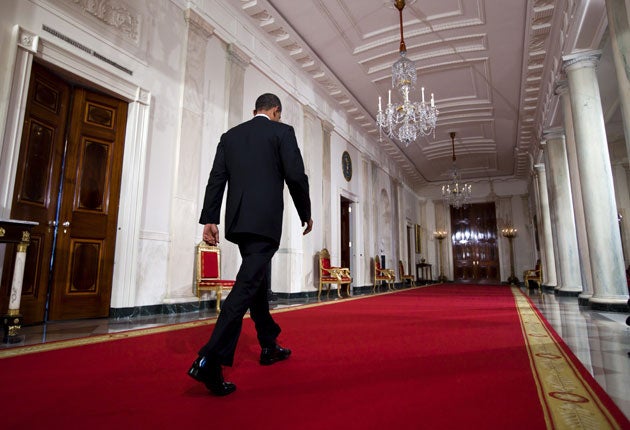He talks of consensus, but Obama faces a long, hard battle

His words were fine. President Obama yesterday talked of consensus, the need for common ground, for civility of discourse. Neither Republicans nor Democrats, he said in that cool, and surreally detached way of his, had a monopoly of wisdom. "We have to sit down together. Americans don't want us to spend the next two years refighting the battles of the last two."
But mere words they will surely remain, and the battles will surely be refought. The overwhelming likelihood is that the sweeping Republican gains in Tuesday's midterm elections and the arrival on Capitol Hill of the Tea Party advance guard will only intensify the deadlock in Washington.
Which is great news for the commentators, the cable TV warriors and the political oddsmakers for 2012. It is terrible news however for a country that is frustrated, confused, and fearful that this grinding economic crisis marks a watershed, separating it from prosperity and global pre-eminence that may never be recaptured.
In narrow terms of winning and losing, everything is still to play for. The earthquake in the House of Representatives, the heavy Democratic setbacks in the Senate and the loss of 10 state governorships are obviously a stinging rebuke for the President, and a repudiation of his policies, at least as voters have been led to understand them. Of Mr Obama's failures, none has been more striking than the failure to connect and communicate by a man who just 24 months ago had electrified the nation.
But we have been here before – most recently in 1994, when Bill Clinton was obliged to plead that he was still "relevant" as President. Sombre and reflective, Mr Obama sounded no less chastised yesterday at his "shellacking" by the electorate. "I've got to do a better job," he acknowledged. Yet the last Democratic president recovered to win convincing re-election in 1996. For Mr Obama too, all is not yet lost.
Like his predecessor, he will probably move to the centre. Mr Clinton went for welfare reform, that upset his base but reassured independents that he was not a wild-eyed socialist. Trade, immigration and education are fields that offer Mr Obama a comparable opportunity now.
Ultimately of course, the economy will be crucial. A double-dip recession will doom this President. But if the recovery takes firmer root, and unemployment starts to fall, Mr Obama will move into 2012 with a gathering wave at his back. Midterm elections moreover are always less of a choice than a protest. Two years hence, he will be running not against an irresistible tide of discontent, but against a flesh-and-blood Republican.
And that Republican is anything but assured of victory. He or she will be representing a party that by dint of its share of power will have a share of responsibility for government. After Tuesday's House landslide, the temptation will be to overreach – just as Newt Gingrich, the incoming Speaker, overreached in 1994.
Back then, the crunch came over a government shut-down, following the failure of the Republican House and the Democratic White House to agree on a budget. There may be a similar showdown now: either over a resolution to raise the national borrowing ceiling, viscerally opposed by Tea Partyites, or over the budget, if Republicans attempt to carry out their promise to kill healthcare reform by starving the beast of funding.
Finally, the river of support that carried Republicans to their net gain of 60-plus seats in the House – the largest such swing at least since 1946 – ran exceedingly wide, but also exceedingly shallow. It was not an unqualified embrace from voters, wiser Republicans admitted as the triumph took shape, "but a second chance".
That judgement was tacit admission of what voters know full well, that the Republicans who ran Congress as well as the White House for much of the presidency of George W Bush were largely responsible for the crash and recession of 2008, and thus for today's distress. Democrats may be in the doghouse, but poll after poll has shown that Republicans are held in as little esteem, maybe even less. In two years' time, they may be on the receiving end of a shellacking, if things do not improve. The US electorate is as fickle as it is furious. Indeed it is almost schizophrenic.
In a democracy, a ruling party may expect to be thrashed every decade or so. American voters have now administered three thrashings in four years, to Republicans in 2006 and 2008, and to Democrats in 2010. This one was certainly punishment for Mr Obama's shortcomings as a leader – but also for his inability to wave a wand and restore growth, jobs and confidence (and of course eliminate the deficit) in a mere two years, after the deepest slump since the Great Depression.
Americans are proud of their tradition of personal enterprise and keeping government at arms' length. They mock the nanny-states of countries like France. Yet when crisis comes, they expect their government to have all the answers.
This time they have specifically punished incumbents who voted for the bailouts of the car companies and Wall Street banks. Yet voters know the alternatives would have been either the collapse of key sectors of the economy, or European-style nationalisation.
They claim to be fed up with partisanship, gridlock and bickering in Washington. Yet they send to Washington a new Congress tailormade not to solve problems but to perpetuate, even deepen, the gridlock. As the French might say, c'est pas serieux.
Join our commenting forum
Join thought-provoking conversations, follow other Independent readers and see their replies
Comments